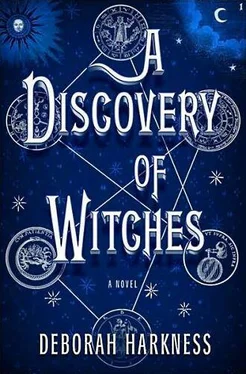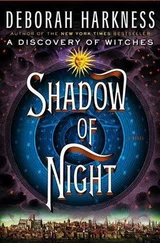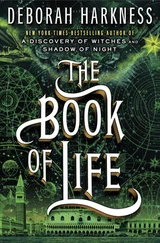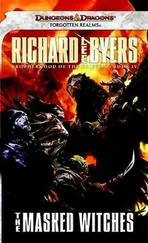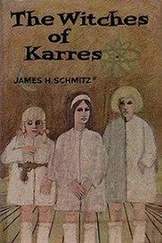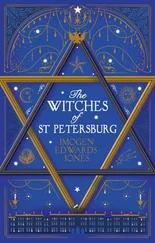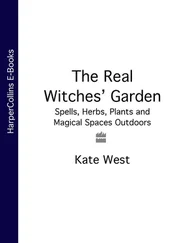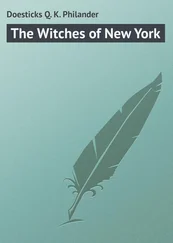The main dish was the only part of the meal that required heat, and not much of it. I had already made a bizarre biscuitlike thing from ground chestnuts. All that was left for me to do was sear some rabbit. The list of ingredients included rosemary, garlic, and celery. I decided to forgo the garlic. With his sense of smell, garlic must overpower everything else—there was the nugget of truth in that vampire legend. The celery was also ruled out. Vampires categorically did not like vegetables. Spices didn’t seem to pose a problem, so I kept the rosemary and ground some pepper over the rabbit while it seared in the pan.
Leaving Matthew’s rabbit a little underdone, I cooked mine a bit more than was required, in the hope that it would get the taste of raw venison out of my mouth. After assembling everything in an artistic pile, I delivered it to the table. “This is cooked, I’m afraid—but barely.”
“You don’t think this is a test of some sort, do you?” Matthew’s face creased into a frown.
“No, no,” I said hurriedly. “But I’m not used to entertaining vampires.”
“I’m relieved to hear it,” he murmured. He gave the rabbit a sniff. “It smells delicious.” While he was bent over his plate, the heat from the rabbit amplified his distinctive scent of cinnamon and clove. Matthew forked up a bit of the chestnut biscuit. As it traveled to his mouth, his eyes widened. “Chestnuts?”
“Nothing but chestnuts, olive oil, and a bit of baking powder.”
“And salt. And water, rosemary, and pepper,” he commented calmly, taking another bite of the biscuit.
“Given your dietary restrictions, it’s a good thing you can figure out exactly what you’re putting in your mouth,” I grumbled jokingly.
With most of the meal behind us, I began to relax. We chatted about Oxford while I cleared the plates and brought cheese, berries, and roasted chestnuts to the table.
“Help yourself,” I said, putting an empty plate in front of him. Matthew savored the aroma of the tiny strawberries and sighed happily as he picked up a chestnut.
“These really are better warm,” he observed. He cracked the hard nut easily in his fingers and popped the meat out of the shell. The nutcracker hanging off the edge of the bowl was clearly optional equipment with a vampire at the table.
“What do I smell like?” I asked, toying with the stem of my wineglass.
For a few moments, it seemed as though he wasn’t going to answer. The silence stretched thin before he turned wistful eyes on me. His lids fell, and he inhaled deeply.
“You smell of willow sap. And chamomile that’s been crushed underfoot.” He sniffed again and smiled a small, sad smile. “There’s honeysuckle and fallen oak leaves, too,” he said softly, breathing out, “along with witch hazel blooming and the first narcissus of spring. And ancient things— horehound, frankincense, lady’s mantle. Scents I thought I’d forgotten.”
His eyes opened slowly, and I looked into their gray depths, afraid to breathe and break the spell his words had cast.
“What about me?” he asked, his eyes holding on to mine.
“Cinnamon.” My voice was hesitant. “And cloves. Sometimes I think you smell of carnations—not the kind in the florist shops but the old- fashioned ones that grow in English cottage gardens.”
“Clove pinks,” Matthew said, his eyes crinkling at the corners in amusement. “Not bad for a witch.”
I reached for a chestnut. Cupping the nut in my palms, I rolled it from one hand to the other, the warmth traveling up my suddenly chilly arms.
Matthew sat back in his chair again, surveying my face with little flicks of his eyes. “How did you decide what to serve for dinner tonight?” He gestured at the berries and nuts that were left from the meal.
“Well, it wasn’t magic. The zoology department helped a lot,” I explained.
He looked startled, then roared with laughter. “You asked the zoology department what to make me for dinner?”
“Not exactly,” I said defensively. “There were raw-food recipes on the Net, but I got stuck after I bought the meat. They told me what gray wolves ate.”
Matthew shook his head, but he was still smiling, and my irritation dissolved. “Thank you,” he said simply. “It’s been a very long time since someone made me a meal.”
“You’re welcome. The wine was the worst part.”
Matthew’s eyes brightened. “Speaking of wine,” he said, standing up and folding his napkin, “I brought us something to have after dinner.”
He asked me to fetch two fresh glasses from the kitchen. An old, slightly lopsided bottle was sitting on the table when I returned. It had a faded cream label with simple lettering and a coronet. Matthew was working the corkscrew carefully into a cork that was crumbly and black with age.
His nostrils flared when he pulled it free, his face taking on the look of a cat in secure possession of a delectable canary. The wine that came out of the bottle was syrupy, its golden color glinting in the light of the candles.
“Smell it,” he commanded, handing me one of the glasses, “and tell me what you think.”
I took a sniff and gasped. “It smells like caramels and berries,” I said, wondering how something so yellow could smell of something red.
Matthew was watching me closely, interested in my reactions. “Take a sip,” he suggested.
The wine’s sweet flavors exploded in my mouth. Apricots and vanilla custard from the kitchen ladies tumbled across my tongue, and my mouth tingled with them long after I’d swallowed. It was like drinking magic.
“What is this?” I finally said, after the taste of the wine had faded.
“It was made from grapes picked a long, long time ago. That summer had been hot and sunny, and the farmers worried that the rains were going to come and ruin the crop. But the weather held, and they got the grapes in just before the weather changed.”
“You can taste the sunshine,” I said, earning myself another beautiful smile.
“During the harvest a comet blazed over the vineyards. It had been visible through astronomers’ telescopes for months, but in October it was so bright you could almost read by its light. The workers saw it as a sign that the grapes were blessed.”
“Was this in 1986? Was it Halley’s comet?”
Matthew shook his head. “No. It was 1811.” I stared in astonishment at the almost two-hundred-year-old wine in my glass, fearing it might evaporate before my eyes. “Halley’s comet came in 1759 and 1835.” He pronounced the name “Hawley.”
“Where did you get it?” The wine store by the train station did not have wine like this.
“I bought it from Antoine-Marie as soon as he told me it was going to be extraordinary,” he said with amusement.
Turning the bottle, I looked at the label. Château Yquem. Even I had heard of that.
“And you’ve had it ever since,” I said. He’d drunk chocolate in Paris in 1615 and received a building permit from Henry VIII in 1536—of course he was buying wine in 1811. And there was the ancient-looking ampulla he was wearing around his neck, the cord visible at his throat.
“Matthew,” I said slowly, watching him for any early warning signs of anger. “How old are you?”
His mouth hardened, but he kept his voice light. “I’m older than I look.”
“I know that,” I said, unable to curb my impatience.
“Why is my age important?”
“I’m a historian. If somebody tells me he remembers when chocolate was introduced into France or a comet passing overhead in 1811, it’s difficult not to be curious about the other events he might have lived through. You were alive in 1536—I’ve been to the house you had built. Did you know Machiavelli? Live through the Black Death? Attend the University of Paris when Abelard was teaching there?”
Читать дальше
